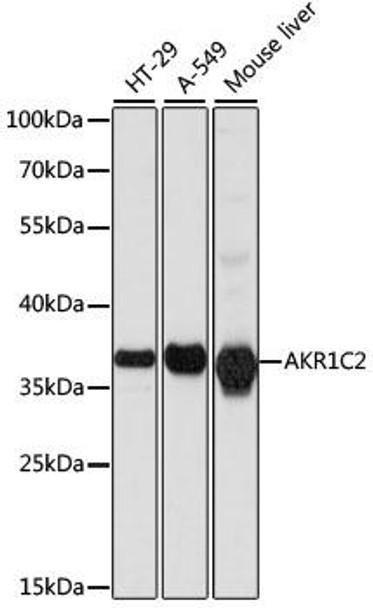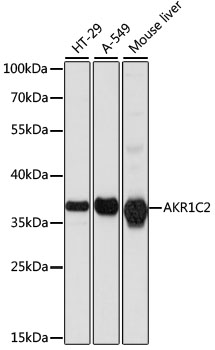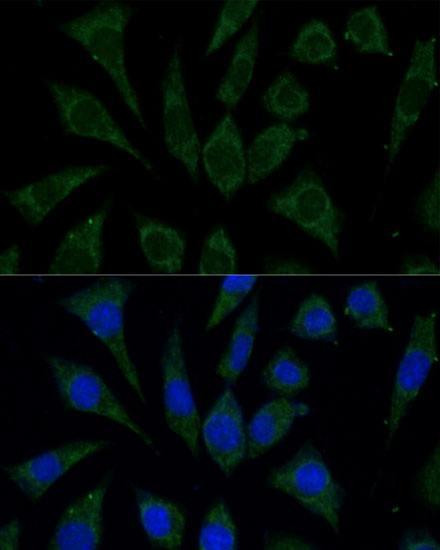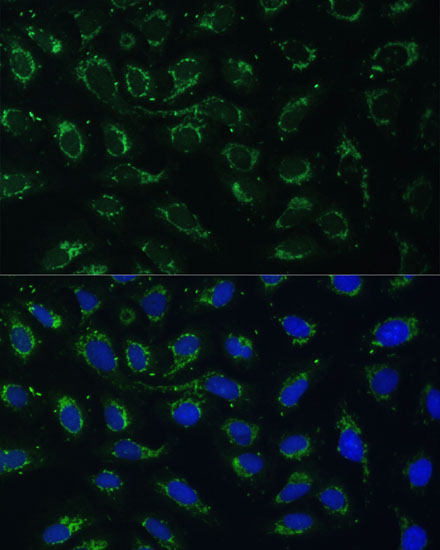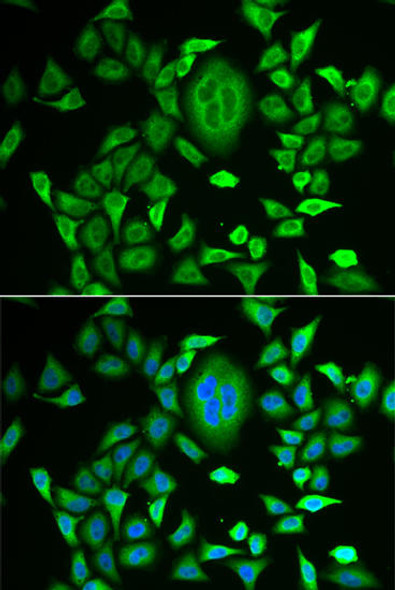Anti-AKR1C2 Antibody (CAB1048)
제품 코드를 사용하여 Assay Genie 메인 사이트를 통해 주문합니다.
주문- SKU:
- CAB1048
- Product type:
- Antibody
- Reactivity:
- Human
- Reactivity:
- Mouse
- Reactivity:
- Rat
- Host Species:
- Rabbit
- Isotype:
- IgG
- Antibody Type:
- Polyclonal Antibody
- Research Area:
- Metabolism
Description
| Antibody Name: | Anti-AKR1C2 Antibody |
| Antibody SKU: | CAB1048 |
| Antibody Size: | 20uL, 50uL, 100uL |
| Application: | WB IF |
| Reactivity: | Human, Mouse, Rat |
| Host Species: | Rabbit |
| Immunogen: | Recombinant fusion protein containing a sequence corresponding to amino acids 1-323 of human AKR1C2 (NP_995317.1). |
| Application: | WB IF |
| Recommended Dilution: | WB 1:500 - 1:2000 IF 1:50 - 1:100 |
| Reactivity: | Human, Mouse, Rat |
| Positive Samples: | HT-29, A549, Mouse liver |
| Immunogen: | Recombinant fusion protein containing a sequence corresponding to amino acids 1-323 of human AKR1C2 (NP_995317.1). |
| Purification Method: | Affinity purification |
| Storage Buffer: | Store at -20°C. Avoid freeze / thaw cycles. Buffer: PBS with 0.02% sodium azide, 50% glycerol, pH7.3. |
| Isotype: | IgG |
| Sequence: | MDSK YQCV KLND GHFM PVLG FGTY APAE VPKS KALE AVKL AIEA GFHH IDSA HVYN NEEQ VGLA IRSK IADG SVKR EDIF YTSK LWSN SHRP ELVR PALE RSLK NLQL DYVD LYLI HFPV SVKP GEEV IPKD ENGK ILFD TVDL CATW EAME KCKD AGLA KSIG VSNF NHRL LEMI LNKP GLKY KPVC NQVE CHPY FNQR KLLD FCKS KDIV LVAY SALG SHRE EPWV DPNS PVLL EDPV LCAL AKKH KRTP ALIA LRYQ LQRG VVVL AKSY NEQR IRQN VQVF EFQL TSEE MKAI DGLN RNVR YLTL DIFA GPPN YPFS DEY |
| Gene ID: | 1646 |
| Uniprot: | P52895 |
| Cellular Location: | Cytoplasm |
| Calculated MW: | 15kDa/36kDa |
| Observed MW: | 37kDa |
| Synonyms: | AKR1C2, AKR1C-pseudo, BABP, DD, DD-2, DD/BABP, DD2, DDH2, HAKRD, HBAB, MCDR2, SRXY8, TDD |
| Background: | This gene encodes a member of the aldo/keto reductase superfamily, which consists of more than 40 known enzymes and proteins. These enzymes catalyze the conversion of aldehydes and ketones to their corresponding alcohols using NADH and/or NADPH as cofactors. The enzymes display overlapping but distinct substrate specificity. This enzyme binds bile acid with high affinity, and shows minimal 3-alpha-hydroxysteroid dehydrogenase activity. This gene shares high sequence identity with three other gene members and is clustered with those three genes at chromosome 10p15-p14. Three transcript variants encoding two different isoforms have been found for this gene. |
| UniProt Protein Function: | AKR1C2: Works in concert with the 5-alpha/5-beta-steroid reductases to convert steroid hormones into the 3-alpha/5-alpha and 3-alpha/5-beta-tetrahydrosteroids. Catalyzes the inactivation of the most potent androgen 5-alpha-dihydrotestosterone (5-alpha- DHT) to 5-alpha-androstane-3-alpha,17-beta-diol (3-alpha-diol). Has a high bile-binding ability. Defects in AKR1C2 are a cause of 46,XY sex reversal type 8 (SRXY8). A disorder of sex development. Affected individuals have a 46,XY karyotype but present as phenotypically normal females. Belongs to the aldo/keto reductase family. 2 isoforms of the human protein are produced by alternative splicing. |
| UniProt Protein Details: | Protein type:Xenobiotic Metabolism - metabolism by cytochrome P450; EC 1.3.1.20; EC 1.1.1.357; Oxidoreductase Chromosomal Location of Human Ortholog: 10p15-p14 Cellular Component: cytoplasm Molecular Function:oxidoreductase activity, acting on NADH or NADPH, quinone or similar compound as acceptor; ketosteroid monooxygenase activity; trans-1,2-dihydrobenzene-1,2-diol dehydrogenase activity; carboxylic acid binding; bile acid binding; aldehyde reductase activity; phenanthrene 9,10-monooxygenase activity Biological Process: steroid metabolic process; G-protein coupled receptor protein signaling pathway; positive regulation of protein kinase B signaling cascade; epithelial cell differentiation; digestion; positive regulation of cell proliferation; progesterone metabolic process; prostaglandin metabolic process Disease: 46,xy Sex Reversal 8 |
| NCBI Summary: | This gene encodes a member of the aldo/keto reductase superfamily, which consists of more than 40 known enzymes and proteins. These enzymes catalyze the conversion of aldehydes and ketones to their corresponding alcohols using NADH and/or NADPH as cofactors. The enzymes display overlapping but distinct substrate specificity. This enzyme binds bile acid with high affinity, and shows minimal 3-alpha-hydroxysteroid dehydrogenase activity. This gene shares high sequence identity with three other gene members and is clustered with those three genes at chromosome 10p15-p14. Three transcript variants encoding two different isoforms have been found for this gene. [provided by RefSeq, Dec 2011] |
| UniProt Code: | P52895 |
| NCBI GenInfo Identifier: | 20532374 |
| NCBI Gene ID: | 1646 |
| NCBI Accession: | P52895.3 |
| UniProt Secondary Accession: | P52895,Q14133, Q5SR16, Q7M4N1, Q96A71, A8K2N9, B4DKR9 |
| UniProt Related Accession: | P52895 |
| Molecular Weight: | 15,748 Da |
| NCBI Full Name: | Aldo-keto reductase family 1 member C2 |
| NCBI Synonym Full Names: | aldo-keto reductase family 1, member C2 |
| NCBI Official Symbol: | AKR1C2 |
| NCBI Official Synonym Symbols: | DD; DD2; TDD; BABP; DDH2; HBAB; HAKRD; MCDR2; SRXY8; AKR1C-pseudo |
| NCBI Protein Information: | aldo-keto reductase family 1 member C2; DD-2; DD/BABP; 3-alpha-HSD3; pseudo-chlordecone reductase; type II dihydrodiol dehydrogenase; chlordecone reductase homolog HAKRD; testicular 17,20-desmolase deficiency; trans-1,2-dihydrobenzene-1,2-diol dehydrogenase; dihydrodiol dehydrogenase 2; bile acid binding protein; 3-alpha hydroxysteroid dehydrogenase, type III |
| UniProt Protein Name: | Aldo-keto reductase family 1 member C2 |
| UniProt Synonym Protein Names: | 3-alpha-HSD3; Chlordecone reductase homolog HAKRD; Dihydrodiol dehydrogenase 2; DD-2; DD2; Dihydrodiol dehydrogenase/bile acid-binding protein; DD/BABP; Trans-1,2-dihydrobenzene-1,2-diol dehydrogenase (EC:1.3.1.20); Type III 3-alpha-hydroxysteroid dehydrogenase (EC:1.1.1.357) |
| Protein Family: | Aspartate-semialdehyde dehydrogenase |
| UniProt Gene Name: | AKR1C2 |
| UniProt Entry Name: | AK1C2_HUMAN |

